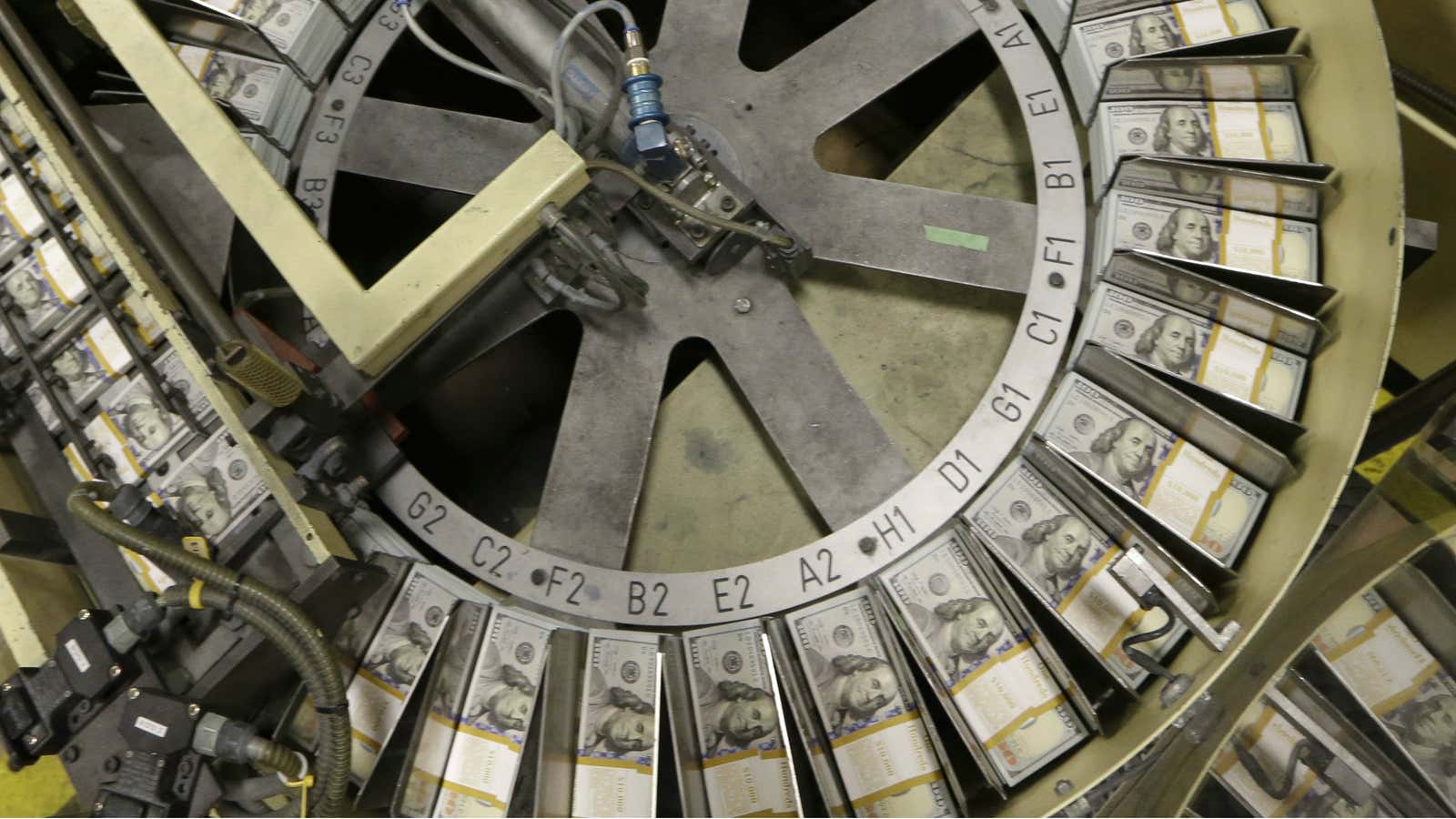Centuries since it was invented, paper cash is still the ultimate in data protection. And if untraceable payments vanish for the first time in human history, we may not be entirely better off for it. You have to squint a little to find people who care about keeping their spending private, but the resistance is out there.
In Sweden, which is poised to become effectively cashless in the near future, there’s the activist group Kontantupproret, or Cash Rebellion, as well as the Pirate Party, a political party. They are concerned about how much easier it is for the government to surveil its citizens when they use electronic money and digital payments’ vulnerability to attack. In the US, a trio of Federal Reserve economists have written since 2000 about a future cashless society in which every expenditure can be monitored. Cryptography experts have raised these issues since the dawn of the internet.
What are they so worried about? Done right, electronic money can bring more people into the financial system, making it cheaper for them to send or receive money from abroad or get insurance. Without question, cash abets criminals and tax evaders. And cash is literally filthy, covered in dangerous microbes.
“There is no such thing as technology that is strictly for good,” said Max Levchin, a PayPal co-founder and CEO of online lender Affirm. While the rise of digital payments has been overwhelmingly positive for society, he said there is always a flip side to such a major shift.
In China, cash is still a far better way to pay for a book about the Tiananmen Square protests of 1989. As William Luther, a director at libertarian think tank American Institute for Economic Research, said recently: “If you’re using your bank account to finance political activity in opposition to the Maduro regime in Venezuela, things might end very badly for you.”
Okay, this may be a concern when it comes to authoritarian regimes, but would a rich, seemingly enlightened government ever do such a thing? Christian Engström, a former Member of European Parliament for Sweden’s Pirate Party, reminded me they already have. PayPal was pressured by the US state department to cut off donations to Wikileaks after it published a cache of diplomatic cables that were embarrassing to Washington. Wikileaks claimed that a “banking blockade” in 2012 by Visa, Mastercard, and Bank of America had cut off more than 95% of donations. (Though these days you can donate to it by credit card, PayPal, cryptocurrency, or even check.)
Just about everyone I talked to about this brought up the Cambridge Analytica scandal. To recap: The company used Facebook data to build psychological profiles of individual US voters prior to the 2016 presidential election, according to Christopher Wylie, a whistleblower and data scientist who says he helped set up Cambridge Analytica. The data reportedly allowed them to assess the kinds of messaging a person was susceptible to, and to whisper individualized messages into the ears of millions of voters. One person’s data doesn’t matter all that much. But on a national scale, it showed how an immense cache of such information could be powerfully able to influence society.
Apple CEO Tim Cook underscored this point in a speech in Brussels in October. He said our boring, everyday information that didn’t seem worth protecting has been used to create digital profiles in which companies know our instincts better than we do, part of a “data-industrial complex” in which private information is “weaponized against us with military efficiency,” he said. His comments are self serving, of course—Apple sells iPhones instead of advertising like Cook’s biggest rivals do. But it’s worth nothing that the Apple Pay doesn’t give your personal data to third parties, according to its privacy agreement. Google Pay makes no such guarantees.
Data concerns are “the new normal and it’s not just payments related,” Levchin pointed out. We already carry surveillance devices (smart phones) in our pockets. These worries also pertain to things like healthcare and education. Going back to paper for record keeping isn’t an option, and someday paper cash, the state of the art when it comes to anonymity, may not be an option either.
In 2000, several Fed economists correctly predicted a race between creating technology for tracking as well as to conceal transactions. Facebook and Google have had wild success at surveilling users to sell advertising. Bitcoin and its cryptocurrency offshoots aren’t widely used for regular payments, but they can help controversial groups stay beyond the reach of government lawyers. Payment companies have developed things like tokenization, which limit the number of places our personal information is held, which could at least help limit the risk of data breaches.
Charles Kahn, a Fed economist, pointed out that central banks, because they issue physical currency, are already in the business of providing transaction privacy—whether they intended to or not. As society becomes more cashless, their new job, instead of printing paper money, could be to regulate and protect payment privacy. That would make sure central bank money remains stable, secure, and safe to use.
For now, protections for everyday users are increasingly inadequate. Bitcoin and its ilk might work for Wikileaks when they’re in a jam, but the rest of society needs something in between volatile cryptocurrencies and mega companies sucking up one more rich trove of personal information.
